16 Node.js Frameworks for Biz App Development in 2024
Explore 16 leading Node.js frameworks redefining business application development in 2024, enhancing performance, and enabling rapid prototyping.
 December 5, 2023
December 5, 2023 8 minute reading
8 minute reading
Node.js revolutionized web development, empowering front-end JavaScript developers to start creating server-side web applications without needing to learn a new programming language. It also turned JavaScript into a first-class web development language.
As this JavaScript runtime environment’s popularity has grown, so has the quantity of frameworks for it. These frameworks improve app performance, add real-time capabilities, allow for rapid prototyping, improve error-handling and debugging, and make taking your products to market easier. Node.js frameworks have become so advanced that you can now even develop cross-platform software for Linux, Windows, and MacOS using Node and the Electron framework.
But npm lists more than 40,000 packages related to Node.js. That’s a lot of modules to choose from. To help you narrow down the choice, we’ve selected 16 of the best Node.js frameworks to speed up your business app development process.
1. Express.js
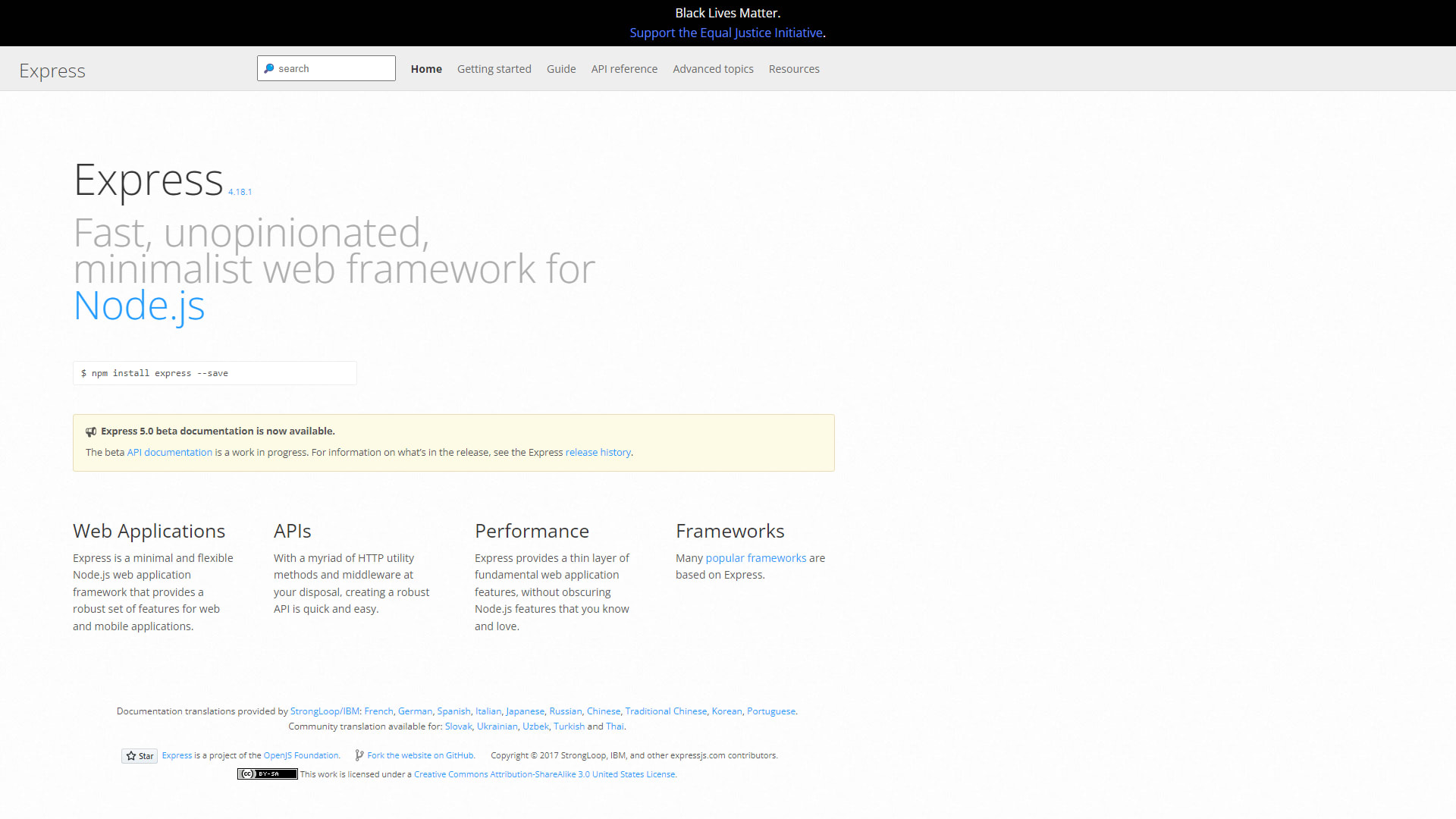
Screenshot of Express.js website
Express.js is one of the most popular open-source Node.js frameworks, with more than 61,000 stars on GitHub. It provides template engines, routing functionality, and middleware features to handle web requests and responses easily.
The Express.js developers made the framework as minimal as possible, focusing instead on robust core features. Express.js makes it far easier to develop typical web application features such as cookie management, error handling, session management, and authentication.
The MEAN stack—MongoDB, Express, Angular, and Node—has become popular for building web applications that run entirely on JavaScript code. The stack is suited to everything from small web applications and microservices to powerful APIs meant to be consumed at scale.
If you need help implementing this stack, you can find freelancer web development services on Fiverr to get it done for you.
Setting Express up is easy, making it ideal for beginners and advanced users alike. To install Express, use the following npm command:
npm install express
You can then create a new Express project by executing:
express my-app
Finally, start the Express server with:
node my-app
2. NestJS
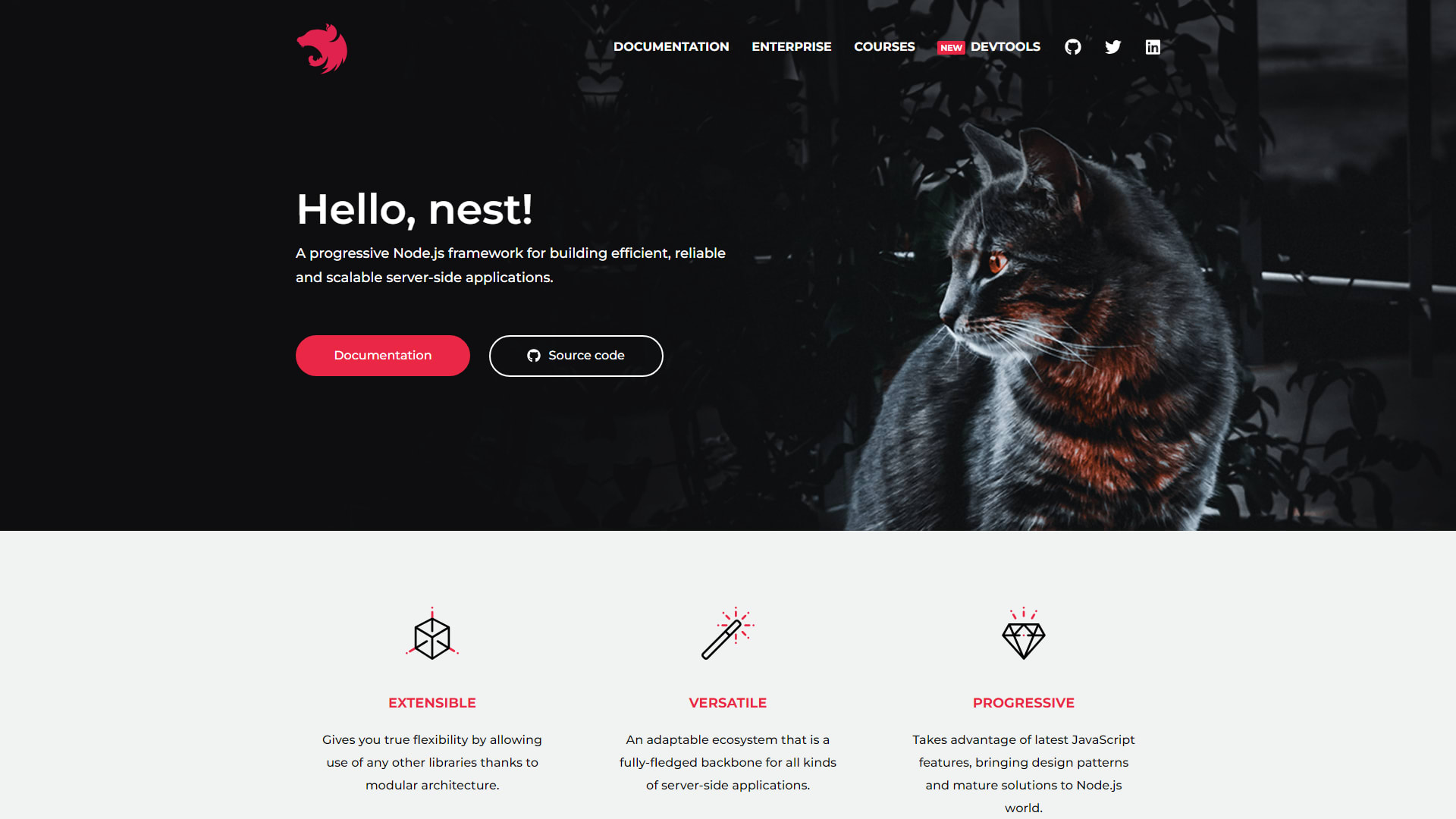
Screenshot of NestJS website
NestJS is a progressive framework, meaning you can start using it immediately, little by little.
NestJS is an excellent choice for use cases where you must build scalability into server-side applications. The framework is especially suited for enterprise-level applications.
The NestJS team created the framework using TypeScript, a strongly typed version of JavaScript.
3. Koa.js

Screenshot of Koa.js website
Koa was developed by the same team that created Express.js. The framework is more lightweight than Express, and uses async JavaScript functions, so developers don’t have to implement callbacks, which can get messy.
The Koa team also put a lot of attention on error-handling. By default, the Koa framework catches all errors, whether synchronously or asynchronously. They do this by adding the error-handling to the top of the middleware stack.
Unless you change it by setting app.silent to true, Koa emits all errors to stderr.
But Koa further simplifies error-handling for Node.js developers by letting developers use familiar try...catch blocks to catch errors, in contrast with Express, where functions have to explicitly pass errors to the following middleware function. This simplicity makes Koa’s learning curve much smoother than Express’s.
If you’re struggling to debug your existing application and need help resolving it, you can find freelancer bug-fixing services on Fiverr.
4. Hapi.js
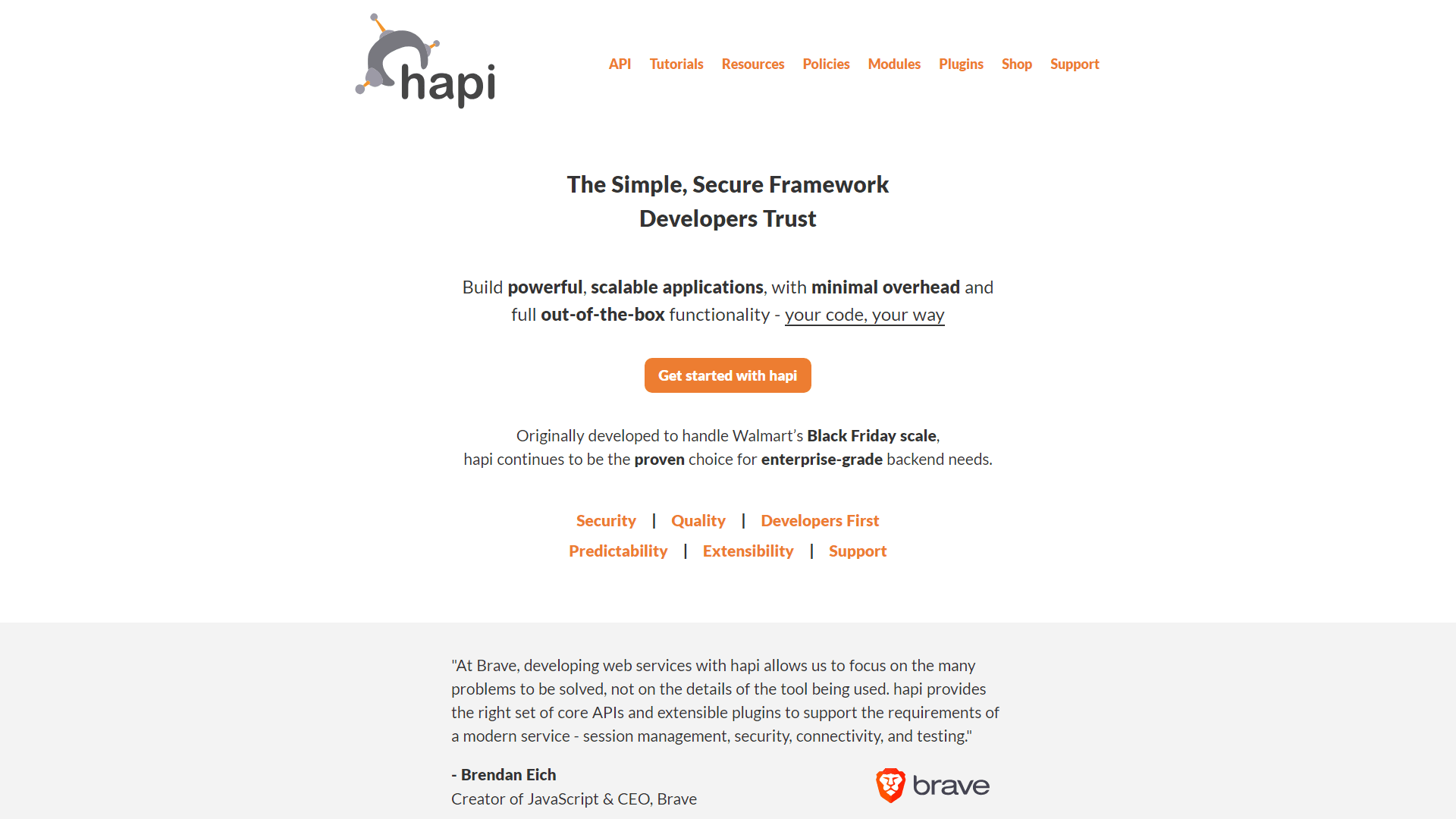
Screenshot of Hapi.js website
Hapi is a rich back-end framework for enterprise-grade Node.js applications. It was initially developed to handle Walmart’s Black Friday Sale. The hapi team has pushed quality control to the max by testing every line of its code across every dependency. The team actively monitors issues and ensures they’re addressed rapidly.
The framework also simplifies middleware confusion. Unlike other frameworks, hapi ensures that plug-ins can safely rely on each other, no matter what sequence you register them in. It also ensures that apps have no routing conflicts.
5. Sails.js
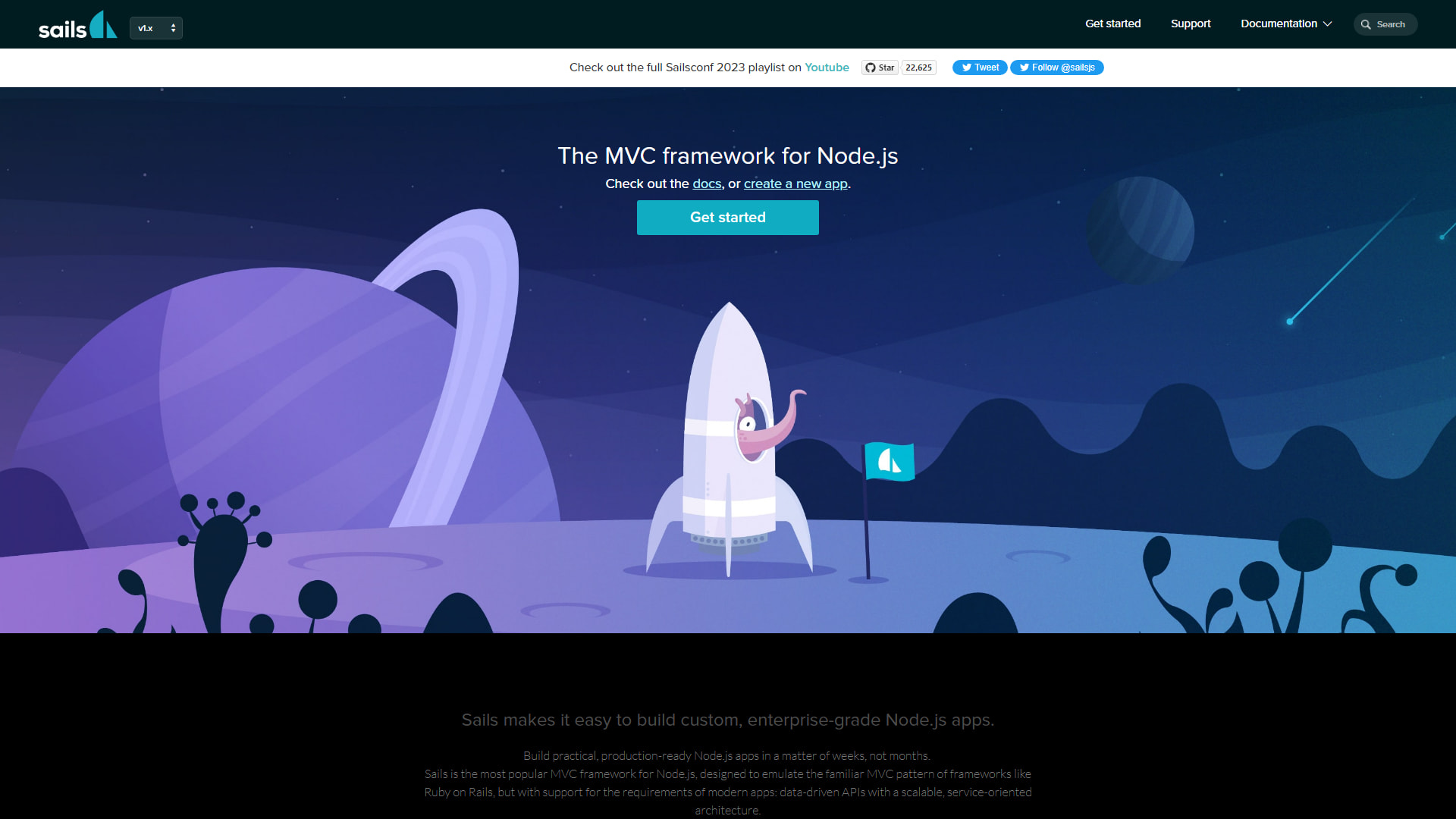
Screenshot of Sails.js website
Sail.js is a front-end agnostic framework, meaning you can integrate your back-end development with any front-end language or framework, such as React, Angular, Vue, Java, Android, or even Windows phones.
It supports WebSockets communications out of the box, so you don’t have to write additional code, whether you’re handling communication via HTTP or sockets. This dramatically simplifies developing web applications that require real-time features such as chat, live notifications, collaboration tools, or live data feeds. Instead of writing special code to handle the two-way, real-time socket aspects, using Sails means you only need to write the code once.
For specialized help in developing real-time features, you can find freelancer web application development services from Fiverr.
Sails makes it easy to generate REST APIs for the back end without you needing to write any code. For example, you just have to run the sails generate api cats command, and Sails will generate APIs to handle all the fundamental operations necessary to handle cats—such as search, pagination, filter, create, destroy, update, associate, filter, and sort APIs.
Sails is an MVC framework (model-view-controller framework), similar to Ruby on Rails, separating the logic and visual layers, making it easier to maintain your website. Its built-in ORM (object relational mapper) ensures compatibility with any underlying data layer, regardless of whether it’s a noSQL or SQL database. Sails provides official adapters for MySQL, MongoDB, PostgreSQL, and even local disk storage, with many community-driven projects existing for other databases.
6. LoopBack
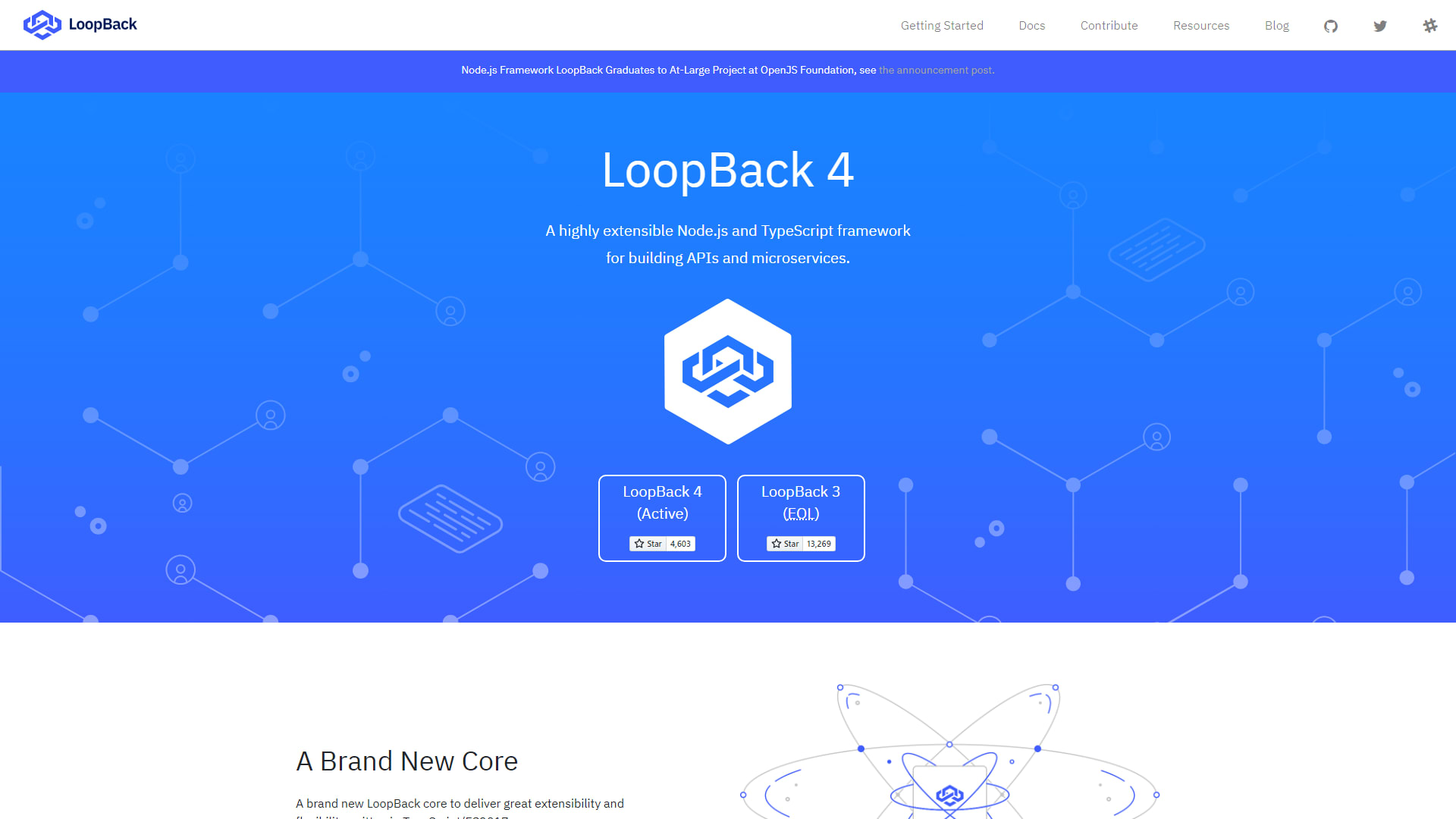
Screenshot of LoopBack website
LoopBack is a Node.js framework specifically for creating APIs and microservices. The project was created by IBM and is incredibly extensible, letting developers use existing connectors to their data sources and work with pre-existing middleware components.
Like many other popular frameworks, Sails provides a simple CLI (command-line interface) tool to quickly scaffold your app and get it up and running. You can create, start, debug, and version your Sails apps using the CLI.
If you want to build APIs and microservices, you can find freelancer API integration services on Fiverr.
7. Meteor.js
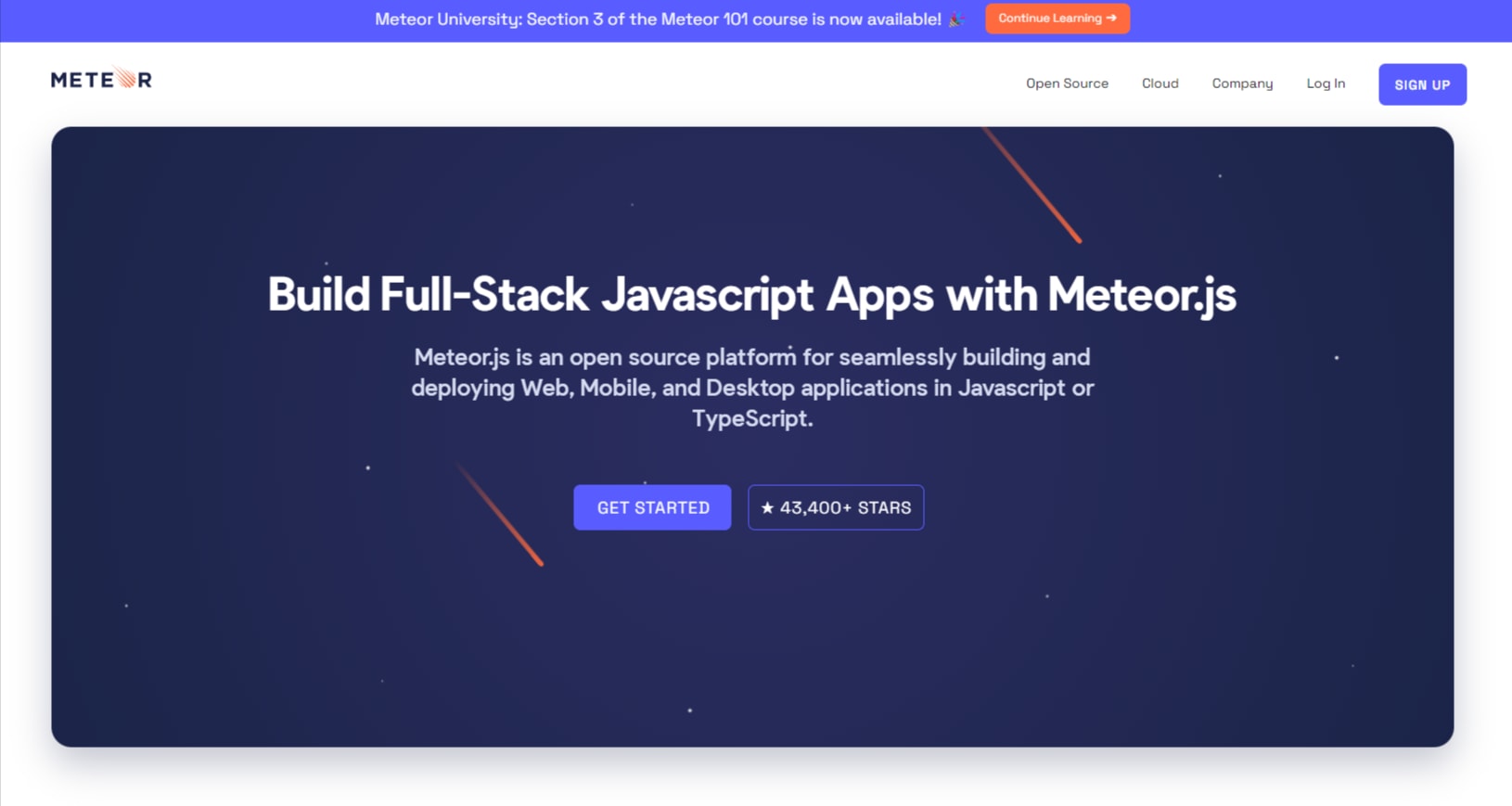
Screenshot of Meteor.js website
Meteor is more than just a Node.js framework—it’s a full-stack suite of tools for developing web apps, mobile apps, and app servers, all done in JavaScript. The suite includes a build tool and select Node.js packages.
When you use Meteor, the server sends data to the browser, not HTML. The client is then responsible for rendering the HTML, significantly reducing bandwidth.
The tool focuses on reactive programming—a paradigm emphasizing responsiveness, resiliency, and message-driven communication.
8. AdonisJS

Screenshot of AdonisJS website
AdonisJS is another full-stack web platform that combines multiple Node.js packages so developers can hit the floor running in their web apps or API server projects. The framework provides out-of-the-box support for routing, file uploading, and validation. It also uses a template engine for creating server-rendered web apps.
The framework has robust testing features backed by powerful APIs and helpers to reset the database state after your tests are finished.
9. Strapi
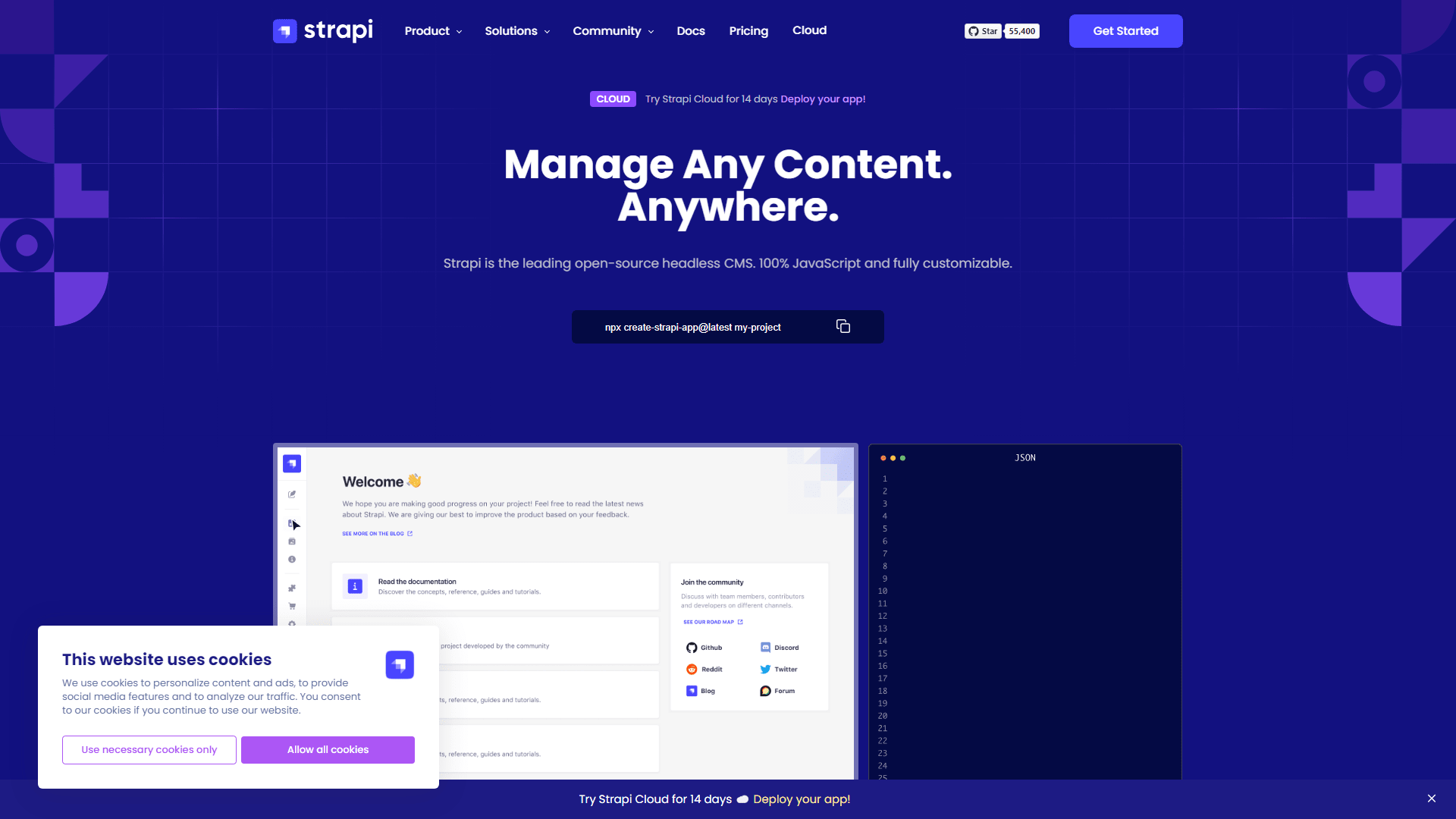
Screenshot of Strapi website
Strapi is a headless CMS (content management system) built on top of Node.js. A headless CMS is a CMS that isn’t connected to a particular platform, such as an app or a website. It’s used purely to create and store content and then provides that content to any consuming apps through APIs.
Using Strapi, you can create back-end content structures in minutes. Your app or website can then get the content from Strapi using standard RESTful API or GraphQL queries.
The framework also has built-in support for caching.
10. Fastify
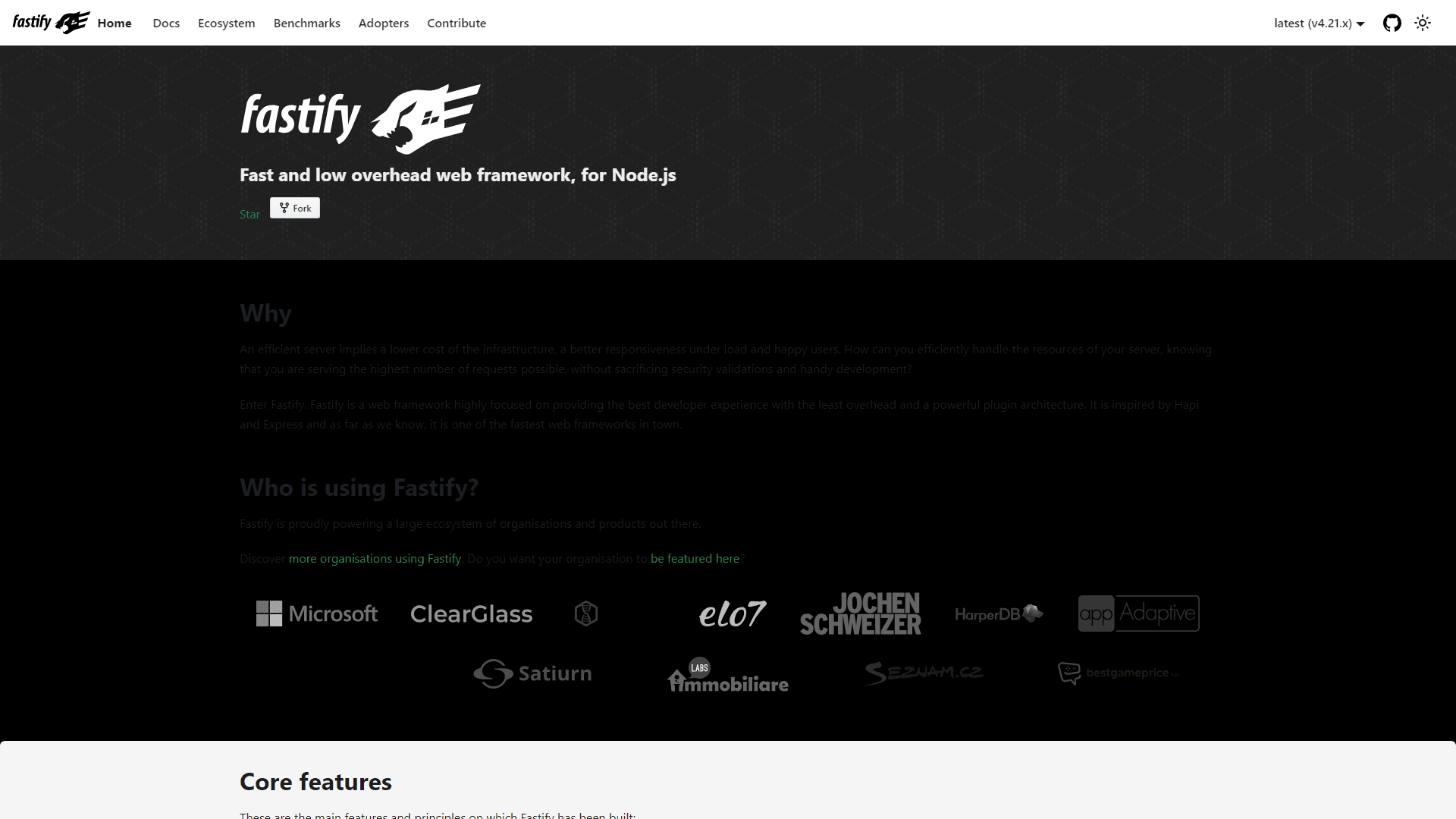
Screenshot of Fastify website
Fastify was developed to provide better responsiveness in web servers regardless of its current load while maintaining a high security level. It's an extremely fast web framework for Node.js.
The framework supports plug-ins and uses a JSON-based schema setup to validate routes. It provides rapid performance, an efficient logging system, and extensibility through hooks, plug-ins, and decorators, allowing developers to extend or modify core functionalities.
To ensure top-notch performance in your web app, you might want to find freelancer speed optimization services on Fiverr.
11. Feathers.js
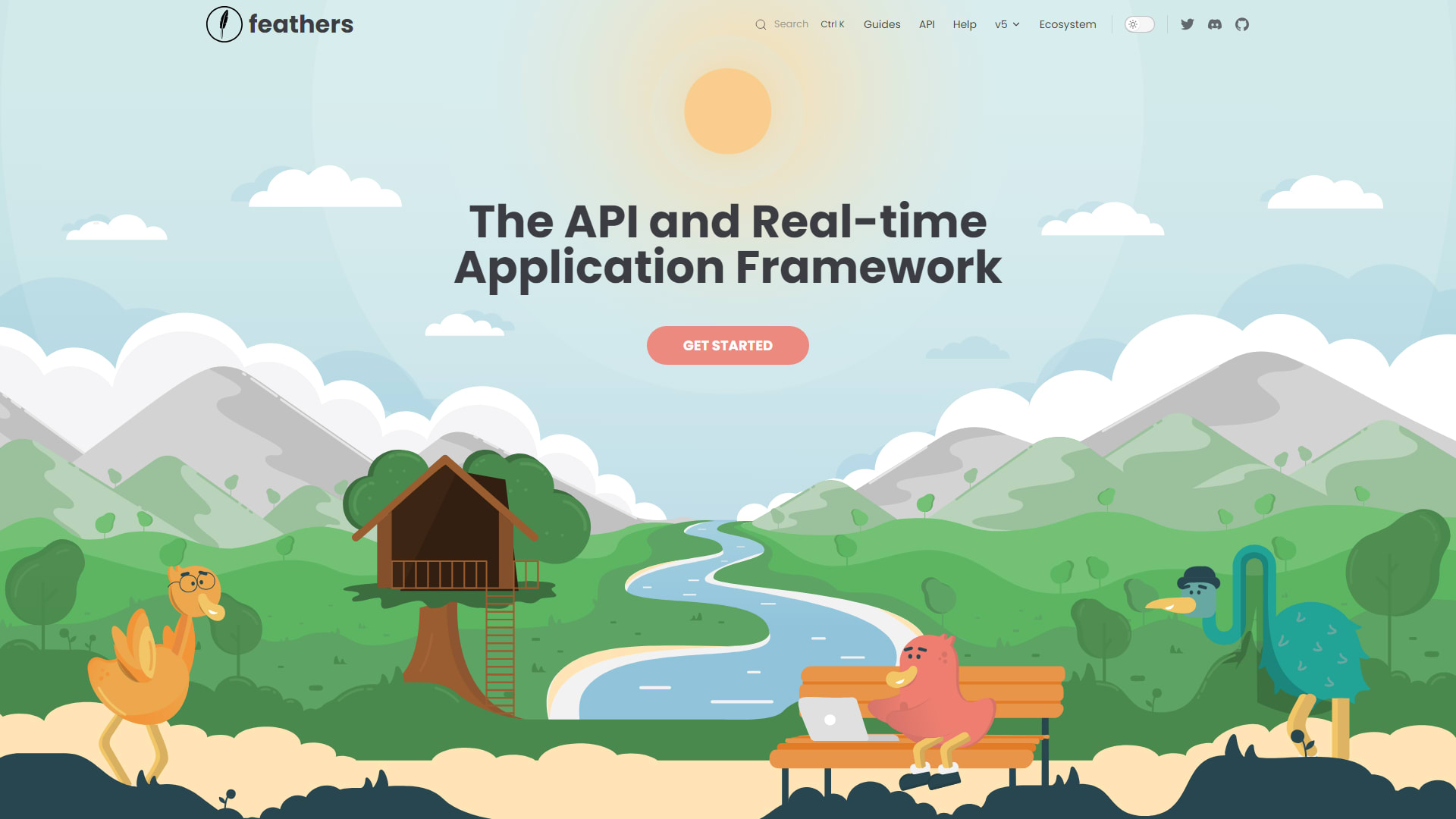
Screenshot of Feathers.js website
Feathers lets you create APIs and real-time apps using either TypeScript or JavaScript. It’s a full-stack web development framework with extensive support for various databases. It’s entirely front-end agnostic, and works with Vue, React, Angular, Android, and iOS.
Feathers provides a powerful CLI tool that lets you create an app within minutes, freeing you from the tedious task of generating code for boilerplate tasks, such as user authentication and database connections.
Using the Socket.io module, you can implement real-time, event-based communication into your app, such as when creating a chatbot or an app with real-time notifications.
12. Nuxt.js
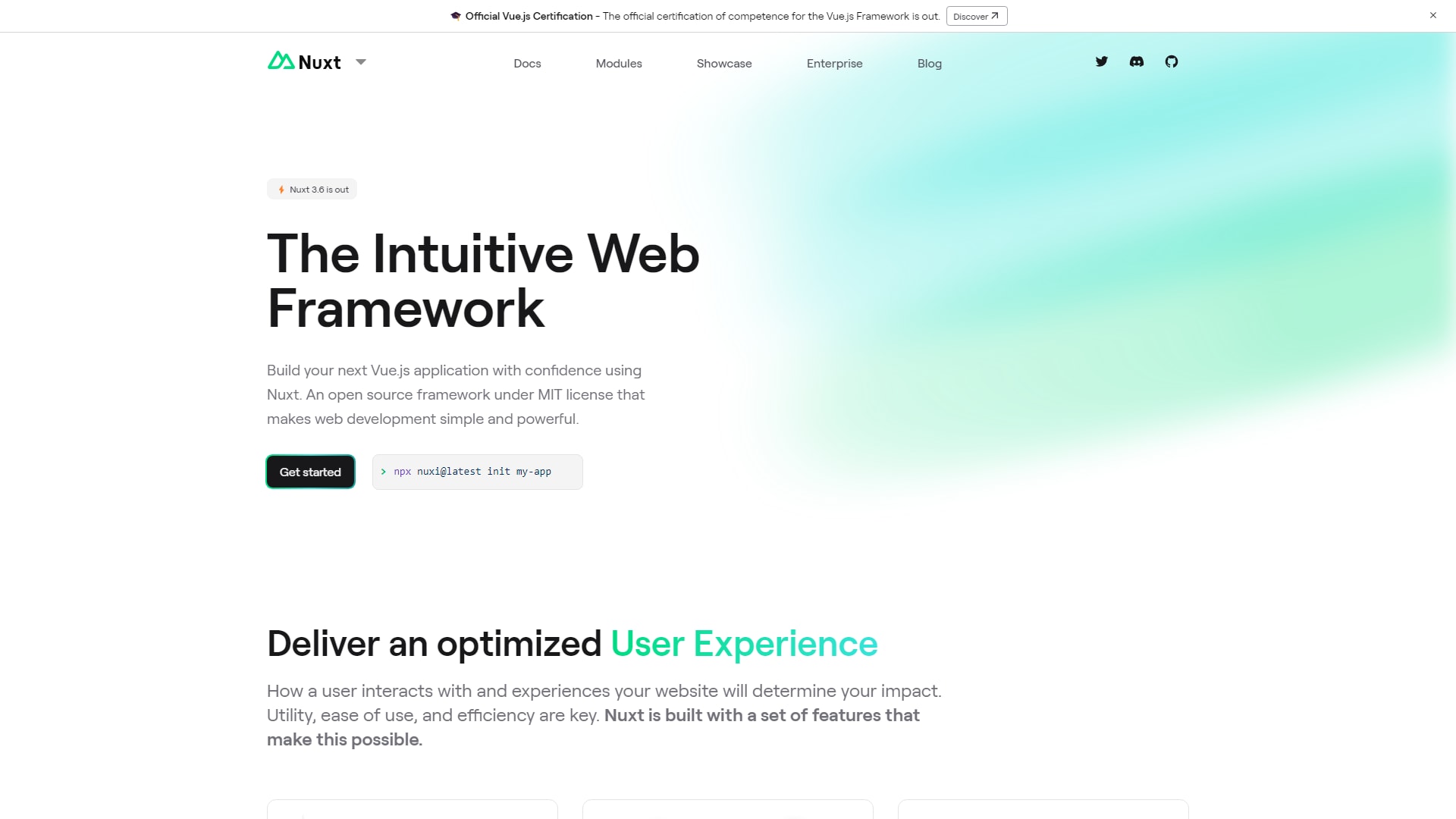
Screenshot of Nuxt.js website
Nuxt was built specifically for the front-end Vue.js framework but gives Vue server-side features. Nuxt lets developers leverage server-side rendering and optimizes images, boosting web app performance and SEO.
It takes care of a lot of your web app’s internal plumbing, such as state management, cookies, and error handling.
Nuxt.JS follows a modular approach, letting developers add further modules to speed up development. It automatically generates routing configuration for the Vue app based on the Vue file structure. And the nuxt generate command creates a fully static website for better SEO.
Nuxt supports internationalization through the nuxt-i18n module for easier multilingual development, and the framework is generally highly customizable.
13. Next.js
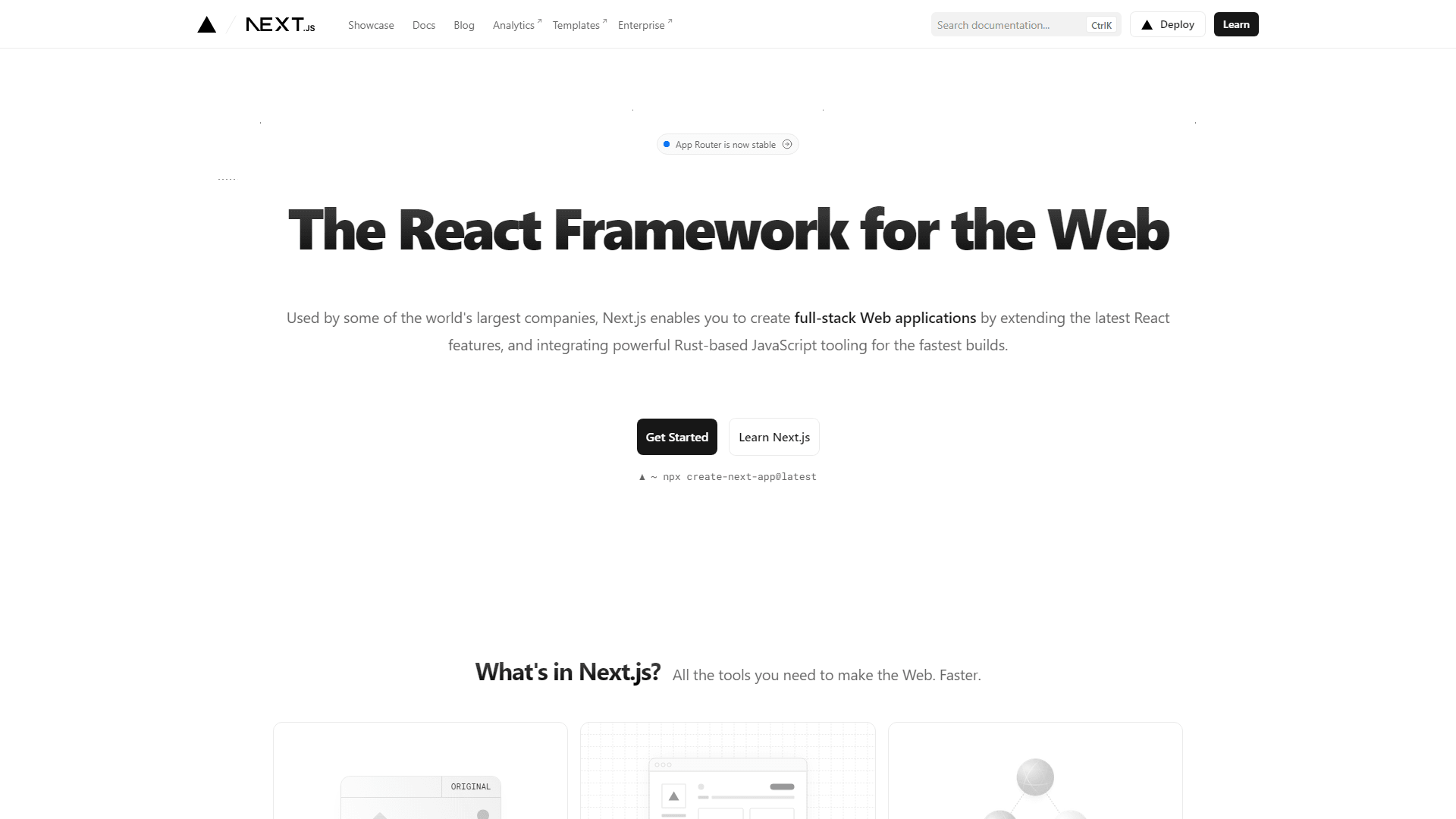
Screenshot of Next.js website
Next.js is similar to Nuxt, but it’s built for React. It brings server-side rendering to React apps, making it easier for search engines to crawl website content. It has built-in support for multiple optimization options, such as image and script optimizations, and caching.
The framework has extensive support for CSS tools, such as CSS Modules, Tailwind CSS, and Sass (Syntactically Awesome Stylesheets), making it easier to use familiar tools when building your website.
14. Total.js
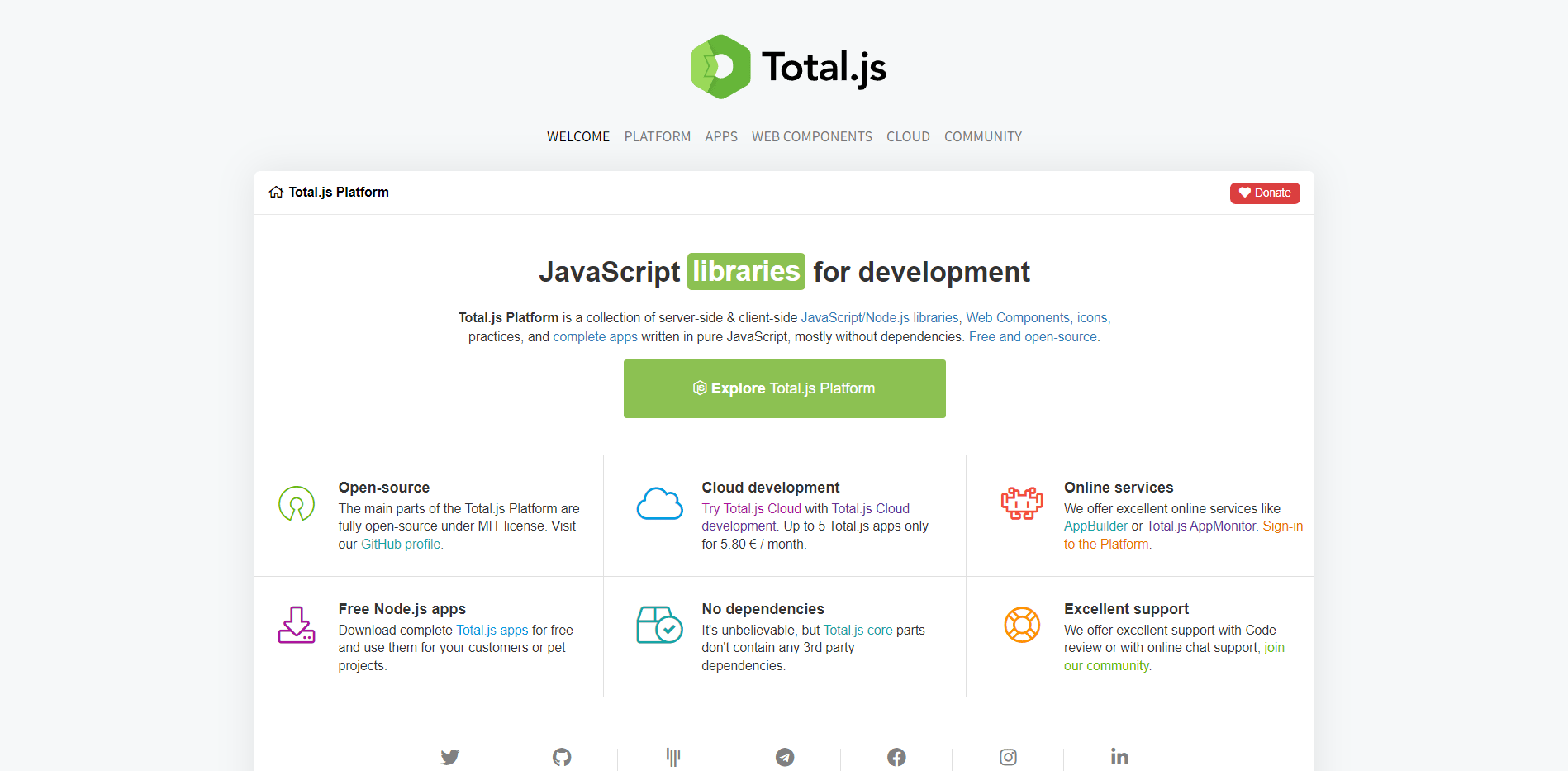
Screenshot of Total.js website
Total.js isn’t a framework in itself but a collection of client-side and server-side JavaScript frameworks and libraries to speed up your application development. The platform provides frameworks for single-page web apps, a CMS, a code editor app, and other Node.js-based tools.
15. ActionHero
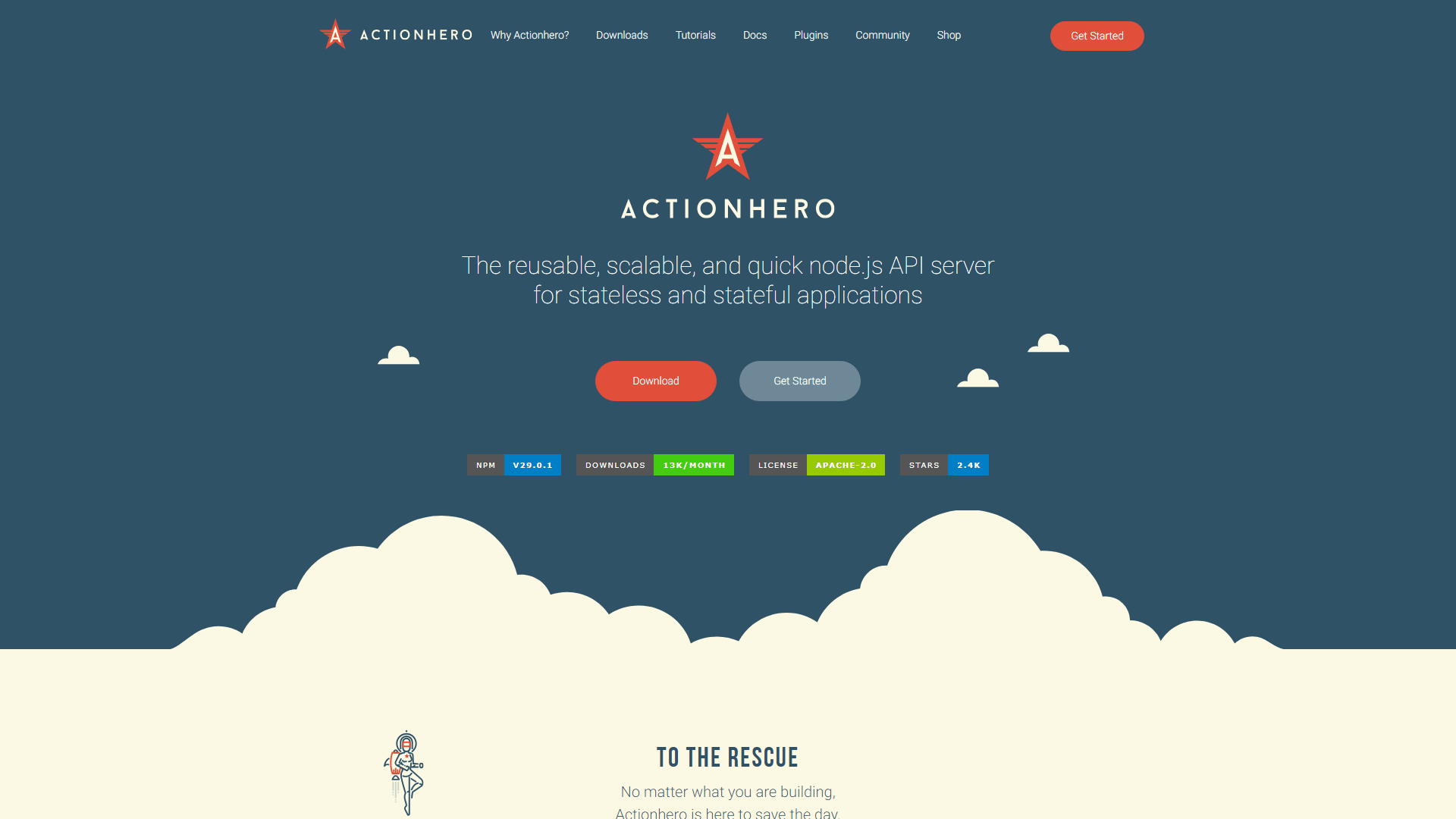
Screenshot of ActionHero website
ActionHero is a Node.js API server supporting stateless and stateful web applications. It has a tiny footprint, making it an excellent choice for IoT apps, and it provides all the necessary tools to create real-time applications, such as chat apps.
16. Polka
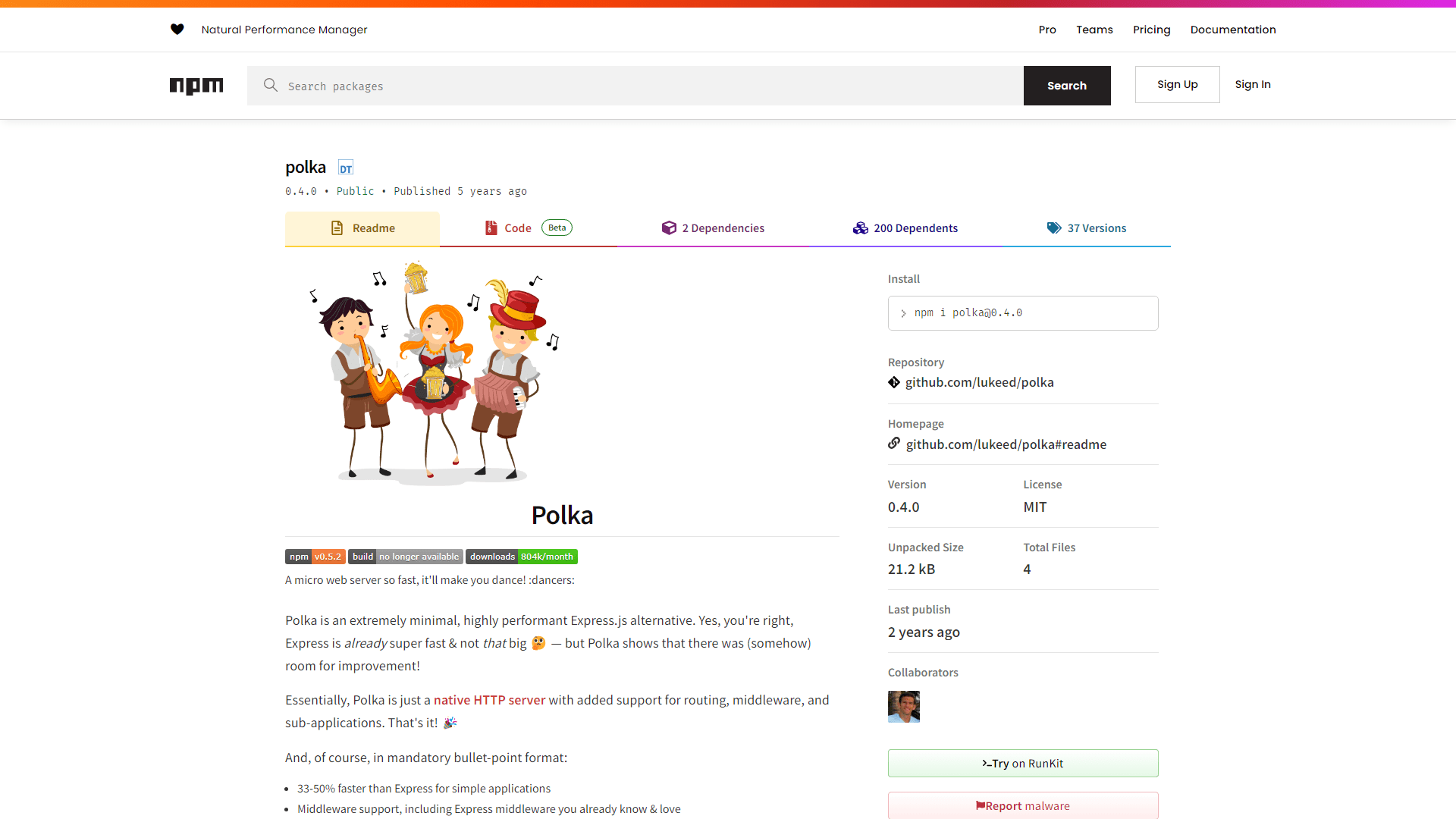
Screenshot of Polka website
If you’re looking for an extremely fast HTTP server, look no further than Polka. If Express is described as minimalistic, then Polka would be ultra-minimalistic. Polka provides little more than an HTTP server with support for middleware, routing, and sub-apps. For many Node.js apps, that’s enough, and the benefit is that Polka runs up to 50% faster than Express.
Polka uses Express’s middleware, so you can jump straight into it if you come from an Express background. It also has almost exactly the same API and route pattern definitions as Express.
The Polka team put together an impressive comparison between Polka and Express, pointing out that the app itself has a lot to do with its speed. Choosing Polka over Express won’t make much difference in speeding the app up if your code isn’t optimized. You’ll need to improve your app’s code first, and you can find freelancer web programming services on Fiverr to help you do that.
Get expert help from Fiverr freelancers
Fiverr connects businesses of all sizes with expert freelancers in software, design, web development, and other areas. On the Fiverr freelance marketplace, you can find a diverse network of professionals to help you with all of your business’s creative needs.
Whether launching a small web application or creating an app for your startup, Fiverr simplifies finding the right talent for your projects.
Depending on how long they’ve been on the platform and the quality of their service, Fiverr’s sellers are ranked by levels. But regardless of the seller level, Fiverr’s Safety Team will do everything possible to ensure that you have a positive experience.
To start, open an account on Fiverr, search for the professional you’re looking for, and strike up a conversation.



